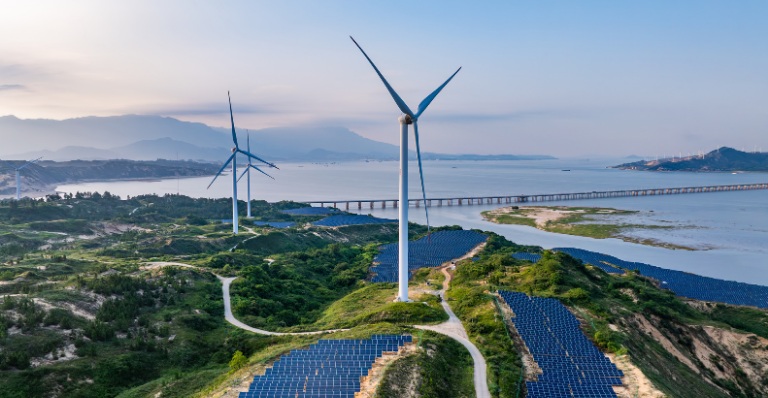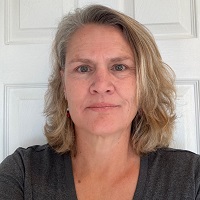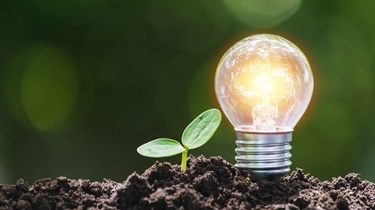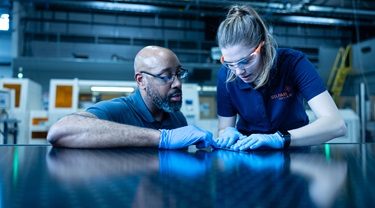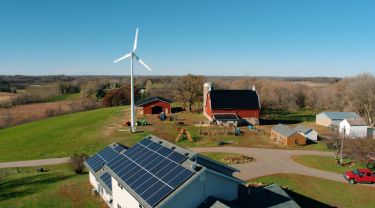
5 Canadian cleantech companies advancing the energy transition
Author details
Karen Turner
Senior international trade editor
In this article:
Despite geopolitical tensions, financing challenges and ongoing tariff threats from the United States, the cleantech industry—in Canada and globally—is rapidly evolving with innovative technologies to power a cleaner, more sustainable future.
Since 2012, Export Development Canada (EDC) has facilitated $50 billion to Canadian cleantech companies and remains a leading financier of the sector. In 2024 alone, EDC supported 500 cleantech companies, working with firms of all sizes to help scale solutions that drive the energy transition forward.
“We didn’t accomplish this feat alone—it was done in conjunction with some fantastic partners all working towards common goals of supporting Canadian innovation, energy transition and powering a cleaner and greener world,” says Sophie Dumoulin, EDC’s director of cleantech.
EDC is hosting our annual Cleantech Export Summit in Toronto, ON, bringing together cleantech innovators, industry experts, investors and ecosystem partners from across Canada to explore the opportunities and challenges in the push towards net zero.
This year’s theme, Powering the world with Canadian cleantech, will highlight breakthrough technologies, market insights, global trade financing options and risk management strategies for firms in the burgeoning sector.
You should also check out
Explore Canada’s cleantech export edge in EDC’s 2025 report on scalable clean technologies.
Every year, EDC recognizes five Canadian cleantech innovators who are developing technologies to support the fight against climate change and the transition towards a more sustainable economy. Here are this year’s honorees:
Iogen Corporation: Turning waste into carbon-negative fuel
Founded: 1975
Location: Ottawa, ON
What they do: Iogen Corporation uses patented technology to convert organic waste—food scraps, manure, straw and corn stalks—into carbon-negative transportation fuels. It refines renewable natural gas (RNG) into recycled carbon (RC) fuel, which is blended into gasoline and diesel to reduce greenhouse gas (GHG) emissions.
“Our whole business centres around processing waste—things that nobody particularly wants,” says Brian Foody, Iogen’s president and CEO. “We develop and deploy our proprietary technology, usually working with major energy companies, to make renewable fuels.”
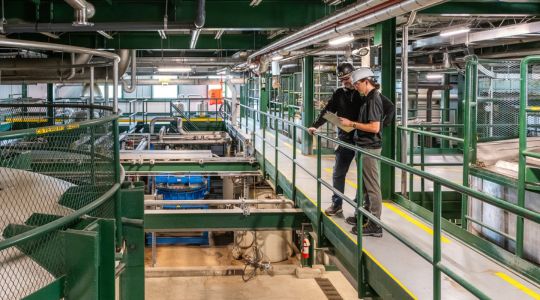
Export markets: United States, United Kingdom and Brazil
Tariffs: Business as usual
Key challenges: “The energy industry is very capital intensive and it’s hard to be in it. The value of your products in the market and the cost of developing them are a constant challenge,” says Foody.
One of the company’s main customers is U.S.-based Valero, the world’s largest independent petroleum refiner and a major producer of low-carbon transportation fuels. But Foody says the threat of U.S. tariffs isn’t impacting his business.
“We acquire North American gas and then have it processed and shipped to Europe. So, it’s not being taxed—we’re not facing tariffs,” says the savvy mechanical engineer.
But he says, “it’s very disappointing that the U.S. is stepping away from the fight against climate change. I think anyone pursuing climate-related technologies needs to look beyond the United States today.”
Tips on entering new markets: “Find a real market where people have real needs and hopefully, they’ll pay you a lot more money than it costs you to deliver” your goods or services, advises Foody, who notes that it isn’t always easy to monetize new technology.
He also cautions against overextending yourself to meet demand and recommends giving yourself ample time to gain traction and build a presence in new markets.
Going global with EDC export guarantees
Support for growth: “EDC has been an important part of our export markets, reaching way back into the ‘90s where their export guarantees really helped us hit international markets—first, in the U.S., then around the world,” says Foody. “EDC has helped us for many, many years, and they’ve been an important part of financing our inventory and receivables for our European business.”
EDC provided comprehensive financial solutions, including credit insurance to protect against non-payment and stabilize cash flow and guarantees to support working capital.
“The International Financing Guarantee team supported Iogen in a complex financing deal that took nearly two years, requiring collaboration across multiple EDC teams,” says Berinder Nehil, EDC’s senior financing manager, Small Business Segment & Partnerships. “This support enabled Iogen to secure necessary bank financing, manage commercial risks and continue its growth trajectory.”
On the radar for 2026: “One of the things on my mind for 2026 is just to try to shift the way people think about regulation. Everybody talks about net zero, but I’m sort of a public evangelist for the role that biofuels can play and that they can do much, much more than people anticipate,” Foody says.
Sollum Technologies: Smart agriculture lighting for greenhouses
Founded: 2015
Location: Montreal, QC
What they do: Sollum Technologies is an award-winning company delivering dynamic LED lighting for commercial greenhouses. Powered by artificial intelligence (AI), its “SUN as a Service” platform adjusts the spectrum, intensity and timing of the lighting in real time—zone by zone—based on crop-specific needs.
Unlike traditional static lighting systems that require manual adjustments, Sollum’s solution adapts automatically while keeping growers in full control via dashboards. This results in higher, more consistent production and reduced energy consumption.
“The system thinks for you—it thinks for itself, thanks to AI,” says Jenny Zammit, Sollum’s marketing and customer success vice-president.
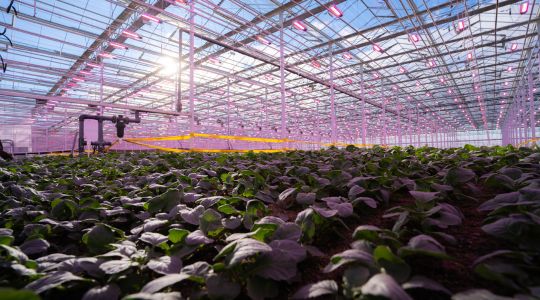
Export markets: U.S., United Kingdom, Netherlands and Switzerland
Overcoming industry inertia and scaling North America
Key challenges: Sollum’s primary market is North America—Canada and the U.S.—but Zammit says the company is closely monitoring changes in policy and isn’t overly concerned about potential tariffs.
“We design, engineer and manufacture in North America, which keeps our supply chain stable and lets us respond quickly to growers’ needs. Local production, plus hands-on support, is why growers choose us,” she says.
The bigger challenge, she notes, is educating the market about the benefits of dynamic LED lighting and changing the mindset of an industry that has been using the same technology for decades.
Tips on entering new markets: Zammit offers three key tips:
- Choose the right partners to manage the risks linked to exporting and execution.
- Understand the problems—your customers’ pain points—and offer solutions, which makes conversations much easier.
- Leverage the strength of the Canadian brand for trust, quality and innovation.
Strategic support fuels innovation and growth
Support for growth: “The support from private equity investors, EDC and other associations has been crucial for Sollum’s growth and innovation, especially in light of the challenges posed by COVID-19,” says Zammit, adding that the pandemic brought the importance of food security to the forefront. “People realized the importance of investing in agriculture and local supply.”
On the radar for 2026: Sollum will continue to expand, exploring potential opportunities in Europe and the Middle East. Next year, they’ll also be building more intelligence into its platform. “Today, our lights automatically adapt in real time to provide the light best suited to any crop, while keeping growers in full control. Our next innovation will allow growers to simulate different lighting strategies and evaluate their potential impact on yield before making a change,” Zammit explains.
eCAMION: EV charging innovation with built-in energy storage
Founded: 2009
Location: Toronto, ON
What they do: eCAMION develops ultra-fast electric vehicle (EV) chargers—capable of fully charging in 10-20 minutes—and energy storage solutions that provide uninterrupted supply of power, even during outages. Their batteries are charged during low-demand hours or from renewables to reduce dependency on the grid and significantly lower energy costs.
Unlike typical EV chargers that connect to the grid through substations, eCAMION’s system uses a large battery called a “Jule Hub” to store electricity that it draws from existing capacity for its charging stations.
“We make the batteries. We make the power electronics. We make the charging stations. We make the middleware, the software, the interface—everything is built by us here in Canada,” says Himanshu Sudan, CEO of eCAMION.
Sudan says the system is up to 65% cheaper to install and uses up to 80% less power from the grid to operate than a traditional charger. “It’s cheaper for utilities and customers to install our system with a battery than it is for them to bring power to a particular location,” he says.
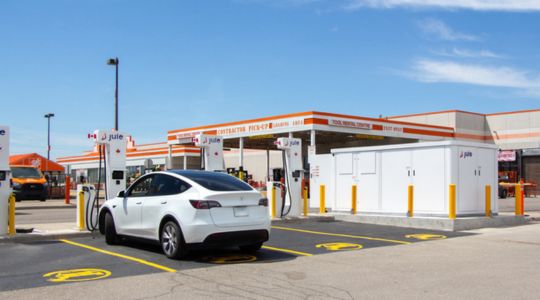
Export markets: U.S.
Scaling EV infrastructure across borders
Key challenges: Accessing capital quickly to secure new contracts is one of eCAMION’s biggest hurdles. In 2024, export sales represented 50% of the company’s total revenues and exports are expected to remain above that threshold going forward. Their major focus now is landing more U.S. contracts.
“When we get contracts from the U.S. government or U.S. utilities, we have to first do the project, then they give us up to 80% of the money back. So, we have to invest 100% of the capital upfront in order for us to do the project,” Sudan explains.
“When you’re talking infrastructure, it takes a significant amount of time and effort to build,” he says. “In this ever-changing environment of uncertainty that we have, we need access to working capital solutions that are nimble with reasonable commercial terms.”
Insights for exporters: Play the long game
Tips on entering new markets: “It’s not always an initial success. It takes time, so have a horizon of two to five years to actually have the impact you’re going for,” says Sudan.
He also recommends networking and building strong relationships with local policy-makers, financial institutions and business leaders to strengthen your in-market presence and choosing a home base rich with a skilled workforce. For eCAMION, Toronto is a prime location because it provides access to university talent, including electrical engineers and computer science graduates.
EDC support fuels growth and global expansion
Support for growth: Sudan credits EDC for providing expert trade knowledge, introductions to key stakeholders and partners and financial support to help eCAMION expand its business.
On the radar for 2026: eCAMION is exploring opportunities in Europe, including Holland, Belgium, France, Germany and the Middle East.
“But these things take time. It’s not a quick switchover,” Sudan explains. “It took us almost seven to eight years to set up shop in the U.S. If we make a commitment to (expand our global markets), it’ll be a two- to three-year commitment.”
Eocycle: Small wind turbines with big energy impact
Founded: 2001
Location: Montreal, QC
What they do: Ecocycle develops small 25-100-kilowatt wind turbines designed to power farms, commercial buildings and industrial facilities. With fewer components, their turbines are more affordable to manufacture and easier to operate and maintain than larger models. Long blades help maximum energy output.
“We don’t want to bring an environmental product; we want to bring a cost-effective solution to the market, which will solve an environmental issue,” says Richard Legault, president and CEO of Eocycle, the only Canadian company in North America specializing in small distributed wind.
“Our customers can produce electricity at a very cost-effective price and beat the grid—produce electricity at a lower price than it costs someone to buy electricity from the grid/local utility. That’s what makes it economically attractive,” he says.
Eocycle’s turbines can operate independently or alongside solar power. Legault says combining wind, solar and storage gives customers year-round flexibility and autonomy, while reducing stress on the grid—especially during peak hours.
“We sell wind turbines to farms and industrial companies that want to produce their own electricity. That way they can significantly reduce their electricity bills and carbon footprint and control their energy costs for the next decades,” he says.
Export markets: U.S., Europe and United Kingdom
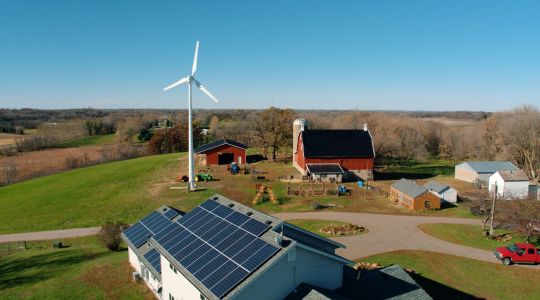
Building credibility and navigating tariffs
Key challenges: As a small Canadian cleantech company with no proven domestic track record, Eocycle initially struggled to gain credibility in international markets. Legault said they also had to “build capacity” to provide full-service solutions such as permitting and interconnection agreements to develop projects.
The company also faced uncertainty due to U.S. tariffs, but successfully certified its products for duty-free shipping to both the U.S. and Europe. Eocycle also took a targeted approach to exporting, focusing on two regions—Minnesota and Belgium—to build its presence before expanding into other states and countries.
Insights for exporters: Be agile and seek expertise
Tips on entering new markets: Legault advises Canadian exporters to seek third-party expertise “to know what you don’t know” to avoid costly mistakes and focus on small wins to grow your business.
“You can’t plan three to five years in advance. Things are changing so fast. Take your time and be agile,” he says.
Support for growth: Government support was crucial to Eocycle’s growth and the development of its intellectual property, including patents and industrial knowledge. But Legault says EDC’s expert guidance and financial backing were essential.
“Without EDC’s expert knowledge and financial support, we wouldn’t be here,” he says.
On the radar for 2026: Eocycle is exploring opportunities in the defence sector, offering energy solutions for remote locations, like Northern Canada, where there’s no grid. Its crane-less turbines are easy to deploy and provide autonomy, making them ideal for defence applications. The company also plans to invest more time in the Canadian market, anticipating rising demand for clean energy solutions.
Mangrove Lithium: Refining Canada’s critical mineral future
Founded: 2017
Location: Delta, BC
What they do: Mangrove Lithium uses electrochemistry to convert and refine extracted lithium into battery-grade lithium for electric vehicles, electronics and energy storing systems. Its process doesn’t rely on chemical-intensive methods of conventional refining and its modular system can be located near extraction, recycling, or manufacturing sites, helping to reduce transportation needs and lower the carbon footprint across the battery supply chain.
Fun fact: Lithium is a lightweight, high-voltage capacity critical mineral found in hard rock, saltwater brines, clays and recycled materials. The majority of Canada’s 2.9 million tonnes are found in Quebec, Alberta and Saskatchewan.
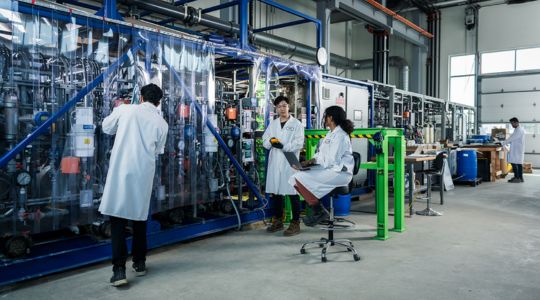
Strengthening North America’s lithium supply chain
Key challenges: Currently, about 70% of lithium is processed in China despite being extracted around the globe, making Mangrove’s technology a major opportunity to refine and process lithium in Canada and elsewhere.
“The fragility of the global lithium supply chain is growing every day,” company founder, Saad Dara, recently explained in an interview with CleanEnergy.ca. “Mangrove is building the foundation for a self-reliant, scalable and sustainable North American lithium future.”
Raising capital remains a challenge for expansion. Mangrove is currently building its second refining plant—a state-of-the-art facility in BC that will produce 1,000 tonnes of battery-grade lithium, enough to power 20,000 EVs annually. A much larger commercial facility with 20 times the production capacity is also planned for Canada’s East Coast—an emerging hub for critical minerals and lithium reserves.
Strategic partnerships and EDC support fuel growth
Support for growth: Carl McBeath, Mangrove’s communication manager, says investment support from EDC and other partners, including BMW, Mitsubishi and Breakthrough Energy Ventures, has been “crucial” to building the two plants where Mangrove can demonstrate its technology to a wider audience.
“Critical minerals are more than just a resource—they’re a strategic opportunity for our country and our business,” says Al Pritchard, EDC’s director of sectors. “We’re not just financing projects; we’re helping shape the global energy transition and increasing the resiliency of Canada’s economy.”
Insights for exporters: Stay persistent and flexible
Tips on entering new markets: McBeath advises companies to remain persistent and flexible and emphasizes the importance of strong technology and strategic partnerships. He also highlights perseverance as a key factor in achieving success.
On the radar for 2026: Once the BC facility is fully operational, Mangrove’s primary focus will shift to the East Coast plant, where they plan to work closely with mining companies and battery manufacturers to reduce reliance on external supply chains.
The content for these customer profiles was sourced from company websites, interviews and other third-party resources, but EDC hasn’t independently verified the information or data.












